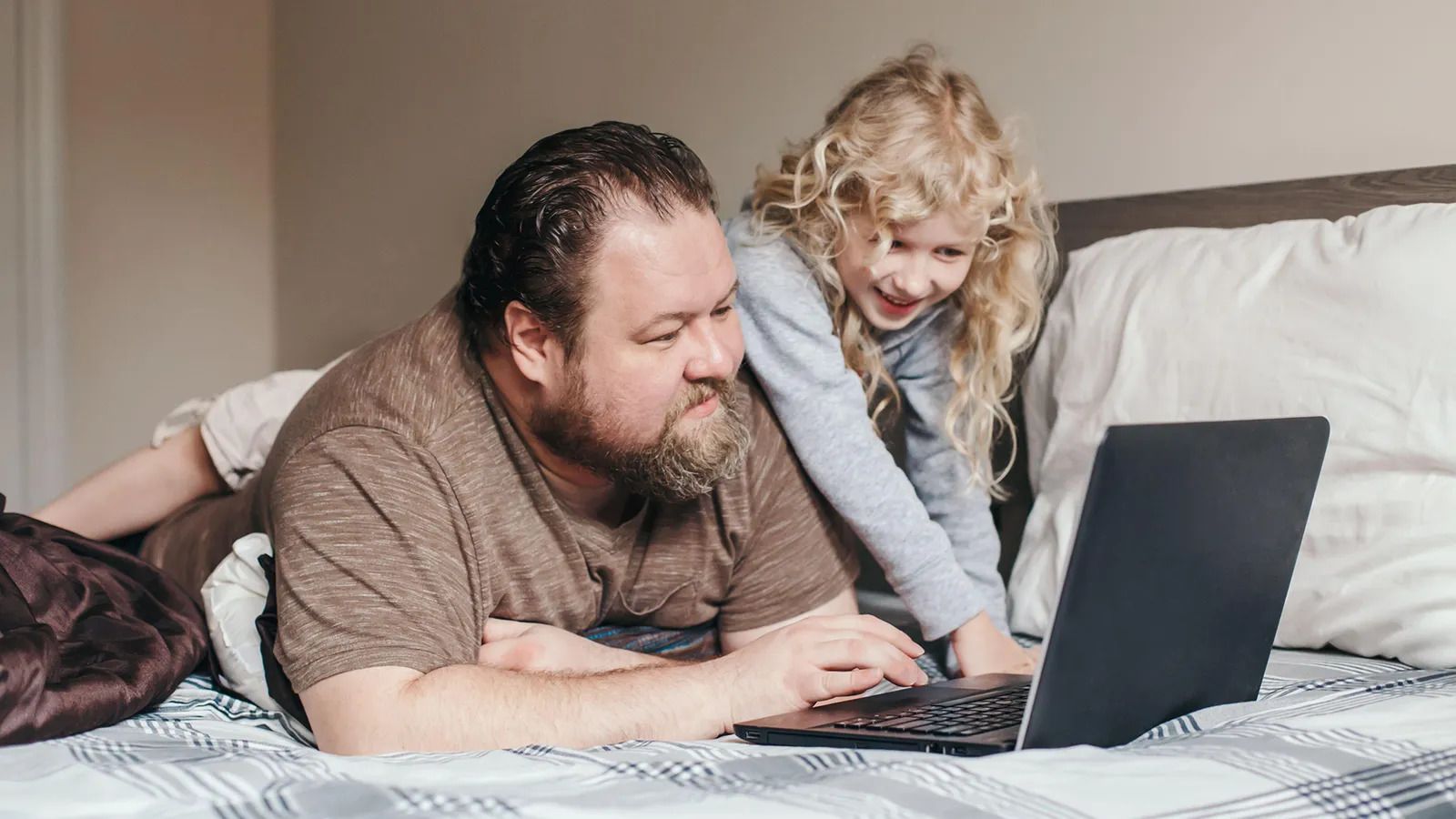
Why it's wrong to look at work-life balance as an achievement
Few topics have been so endlessly analysed, glorified and dissected as work-life balance. The quest to attain this somewhat nebulous state has dominated discourse around careers for years – especially for working parents. The concept is often presented as something to achieve, or a goal to reach. And once you’ve reached it, congratulations: you’ve made it; you’re a successful human being of the 21st Century.
But the problem is that we often tell ourselves: “’I’m going to put in eight hours’ worth of work, and then I’m going to put in eight hours’ worth of me time, which will include my family, my hobbies, my workout, my everything’,” says Anat Lechner, clinical associate professor of management at New York University. “I don’t think it’s such a simple formula.”
And, according to new findings, it may not be. Some researchers are now encouraging us to stop thinking about work-life balance as an achievement that you either hit or don’t. Instead, they suggest it may be more of a lifelong process – a continuous, never-ending exercise that requires vigilance, self-awareness and timely tweaks.
Not a one-time fix
Forget reaching that golden goal: researchers Ioana Lupu of ESSEC Business School in France, and Mayra Ruiz-Castro of the University of Roehampton in the UK argue that work-life balance is a “a cycle, not an achievement”.
In their 2020 study, the researchers interviewed nearly 80 employees at two London-based firms – an equal number of men and women between the ages of 30 and 50, all with at least one dependent child – who worked in middle or senior management roles.
Although it sounds like the respondents had a lot in common, here’s what separated them: about 30% of the men and 50% of the women reported resisting working long hours. The other respondents, meanwhile, all worked long hours because they thought that’s what successful professionals should do.
 The common pitfall is to think of work-life balance as divvying time up
evenly between different realms, like the office or family. But it
doesn't work that way
The common pitfall is to think of work-life balance as divvying time up
evenly between different realms, like the office or family. But it
doesn't work that way
Once Lupu and Ruiz-Castro looked at those who rejected the long hours, they found that those workers actually had strikingly similar strategies for maintaining their work-life balance. They employed more “reflexivity” – or the ability to reflect and question assumptions in the name of self-awareness – and regularly took steps to adjust the things standing in their way of coveted work-life balance.
Workers stopped and questioned their circumstances – reflecting on their emotions and situations, then pinpointed their specific roadblocks to work-life balance. Taking stock and “claiming this mental space to gain clarity of what they want for themselves is the first step toward identifying and implementing alternative ways of working and living,” says Ruiz-Castro.
Lupu and Ruiz-Castro identified five steps that the respondents in the study who had better work-life balance used in their jobs.
First, they paused, de-normalised beliefs such as “I’m a professional, so I should work, work, work”, and asked themselves questions like, “What’s currently causing me stress?”. Second, after identifying the cause, they zeroed in on their resultant emotions – did they feel angry, sad, energised? Third, they reprioritised, asking, “Is working long hours really worth cutting back on family time?”, for example. Fourth, they considered their alternatives: is there anything at work that could be changed to accommodate these new priorities? And finally, they implemented changes, like asking their supervisor for greater flexibility, or deciding not to take on every project that comes their way.
The discussion of ‘work-life balance’ actually masks something else – Anat Lechner
This five-step process is something anyone can adopt. Going through the steps, and constantly checking in with yourself, can help you shift and adapt your professional life to something that will better harmonise with your personal one, their research suggests. “Awareness of your emotional state is essential in order to determine the changes you want to make in your work and in your life,” says Lupu.
New York University’s Lechner agrees that finding that balance is an ongoing pursuit. It’s not simply about divvying up the hours in your day between work, the gym, kids, chores and meditation. Because even if you do make sure the hours are evenly split, if the underlying emotional sources of stress are still there – the kinds of stress that the five-step cycle could help identify – then the time you actually spend at home may not be enjoyable.
“We come home and even though physically we are there, mentally we still may be processing things that happened at work. We’re not present,” she says. “I very often think the discussion of ‘work-life balance’ actually masks something else. What we call ‘work-life balance’ is actually just a proxy to having a sense of fulfilment and contentment.”
 Studies show that personal choices only take you so far in obtaining
work-life balance. A lot of it falls on what your organisation does to
help make it feasible
Studies show that personal choices only take you so far in obtaining
work-life balance. A lot of it falls on what your organisation does to
help make it feasibleOther steps to take
Of course, finding that balance probably shouldn’t be something you have to do by yourself.
Research by Erin Kelly, professor of work and organisation studies at the Massachusetts Institute of Technology, shows companies and managers can play a key role in creating a better environment for workers. For her book, Overload: How Good Jobs Went Bad and What to Do About It, she and co-author Phyllis Moen split more than 1,000 employees at a Fortune 500 company into two groups: one that worked under a management redesign and one that continued working within the existing management structure.
Under the management redesign, many steps were taken to ensure better work-life balance for workers and prevent burnout. Managers were regularly reminded to explicitly support their employees, for example, and workers were allowed to make changes, like cancelling 0900 morning meetings.All of this was done in the name of increasing job satisfaction and giving workers greater flexibility, and to assure workers that it was something management was committed to.
Unsurprisingly, Kelly and Moen found that employees in the redesign group reported less stress, less burnout, were less likely to quit their jobs and, over the next four years, were 40% less likely to quit than those who kept working under the old policies.
“Work-life balance is understood to be an individual’s response – so [people think] ‘it’s up to me to manage the craziness of my work life’,” says Kelly. But organisations need to examine the demands they’re placing on employees. “The root problem is not how the two pieces of work and life come together. It’s that we have unrealistic expectations of what we’re asked to do on the work side.”If your workplace isn’t an environment where work-life balance is possible in the first place, any strides you attempt to make toward it on a personal level will be in vain.
That’s a conversation that appears to be gathering pace since the pandemic ripped up the rule book for how we work as well as reshaped our working lives. The new prevalence of remote work, flexible work or even ‘hybrid’ working models will likely all play important roles in how we balance our professional and personal lives going forward.
And if it seems like finding that perfect balance remains elusive, the experts say that keeping some perspective can help. We’re in an era of catastrophic job loss; the pandemic alone has slashed 255 million jobs worldwide, and more jobs could be lost in the next decade as AI advances and more offices digitise. For millions of people, work is about being able to put food on the table. Talking about work-life balance “is a very privileged conversation”, says Lechner. “If we’re reflecting, maybe we should also reflect on that.”










